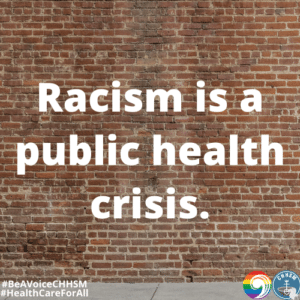CHHSM and COREM Submit Resolution to the UCC General Synod Declaring Racism a Public Health Crisis

The UCC’s Council for Health and Human Service Ministries (CHHSM), in collaboration with the UCC’s Council for Racial and Ethnic Ministries (COREM), has submitted “A Resolution to Declare and Respond to Racism as a Public Health Crisis” for consideration at the denomination’s Thirty-Third General Synod in July 2021.
“The upcoming General Synod is an opportunity to engage the wider church on racism as a public health crisis,” says the Rev. Elyse Berry, CHHSM’s associate for advocacy and leadership development. “CHHSM and COREM sought input from several UCC-related ministries — including CHHSM member Advocate Aurora Health, church leadership, Justice and Witness Ministries, and Overdose and Drug Use Ministries — in shaping this resolution.”
The resolution asks the Synod to call upon the national settings of the UCC “to enable and encourage [all settings of the church] to:
- Raise the church’s consciousness of racism as a public health crisis from theological, bioethical, and public health perspectives.
- Monitor and advocate for public policies that work toward health equity by addressing the social determinants of health, and divest from those that cause harm, violence, and death.
- Discover ways current ministries and mission connect with and can address racism as a public health crisis and explore new ways of incorporating this lens into the life of the church.
- Examine, in radical honesty, past and current organizational policies and practices in how they contribute or create barriers to health equity and racial justice.
- Identify current and potential relationships with members of CHHSM, COREM, other health and human service organizations, advocacy groups, faith and community-based organizations, and academic institutions to collaborate on responding to racism as a public health crisis.

The resolution also calls upon U.S. Congress and state legislatures to pass legislation addressing social determinants of health and The Anti-Racism in Public Health Act. The act would create a Center on Anti-Racism in Health and establish a Law Enforcement Violence Prevention Program at the CDC.
Additionally, the resolution offers biblical and theological rationale for declaring racism a public health crisis. It cites both Isaiah 65 and Matthew 25 in stating, “God calls us to repair our world to one of health equity, where everyone has the opportunity — free from barriers — for a life of health and wellbeing.”
“Most poignantly, “ the resolution continues, “the public health concept of health equity names racism as a longstanding and present danger … which has led to avoidable health disparities for People of African Descent, Indigenous Peoples, and other People of Color. Caused by racist policies and power, People of Color experience poorer health outcomes and lower life expectancy at disproportionate rates.”
The resolution also emphasizes that “as Christians, we follow a messiah who preached a message of interconnectedness and died by state-sanctioned violence for doing so. However, Christ shows us that violence does not have the final say, and that the way forward is through healing that is justice — through restoring right relationships with humanity and all creation. So, let us recommit ourselves to the call of the beloved community, where barriers to wellbeing are broken down and systems are reimagined to make it so.”
In conjunction with the resolution, CHHSM and COREM are developing a resource to help UCC members understand the issue more deeply and articulate ways to take action.
The resolution is the latest in a series of Synod resolutions to grapple with the continuing effects of the United States’ history of slavery, failed Reconstruction, and the Jim Crow laws. As the resolution points out, “Health equity is holy, in how it is an expression of liberation and a path towards shared abundant life together. As a movement towards wholeness, achieving health equity is the work of the Spirit and reflective of the healing ministry of Christ.”
Says Berry, “Although the magnitude and overwhelming reality of racism can evoke a sense of powerlessness, responding to racism through the strategy of public health is an actionable way forward on the path to justice. There is reason to have hope, and the church can be a vessel for that hope to come alive, with each member of the Body of Christ having their own unique role to play, gift to give, and worth to claim.
“To be a disciple is to be anti-racist; and to be anti-racist is to transform racist policies and beliefs into ones that support the life God gave all of us to flourish, and not merely to survive.”
Join Our Mailing LIst
"*" indicates required fields
Follow on Facebook
Pension Boards appoints David A. Klassen as its President, CEO - United Church of Christ
www.ucc.org
The Pension Boards, an affiliated ministry of the United Church of Christ recently announced its appointment of David A. Klassen as its next President and